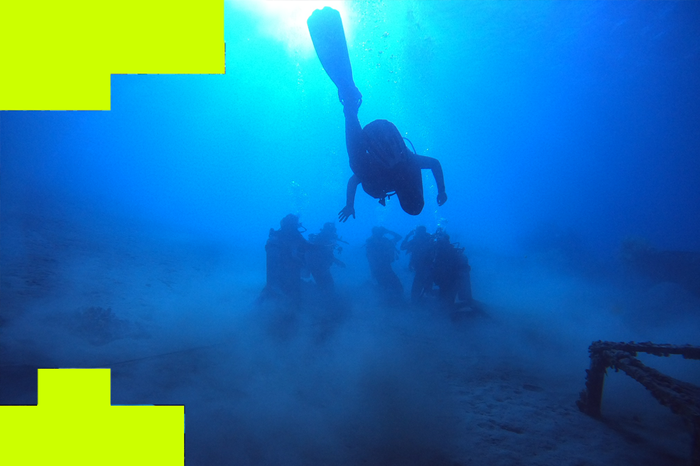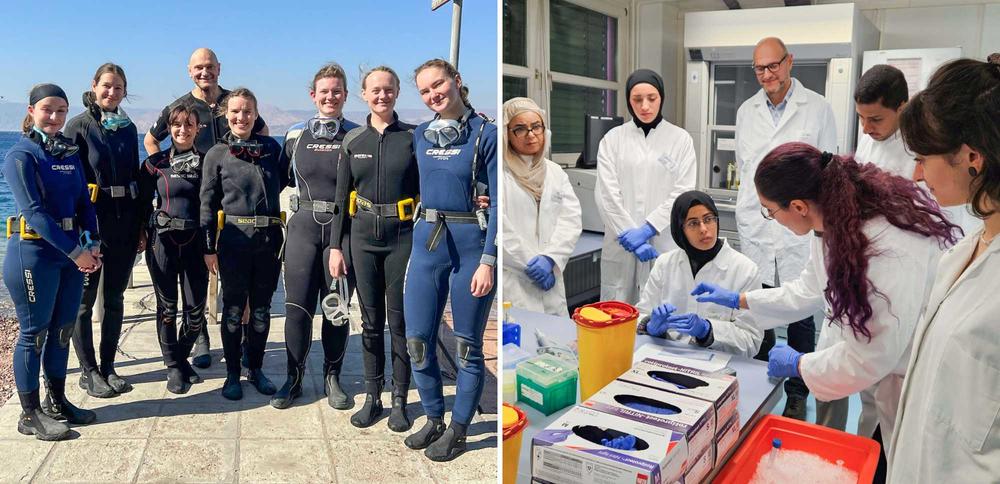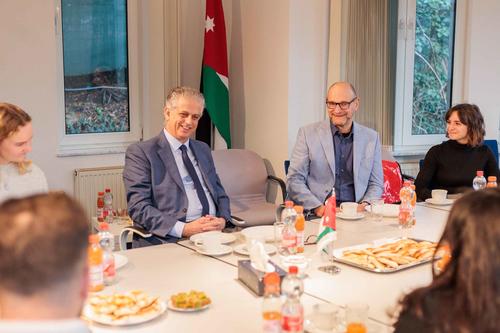First Student Exchange between Freie Universität Berlin and the University of Jordan
Students from the School of Veterinary Medicine at Freie Universität Berlin and the University of Jordan, Aqaba Branch, completed one-week internships in Jordan and Germany
Jan 24, 2025
A dive in the Red Sea near the port city of Aqaba formed part of the marine physiology internship for six students from Freie Universität Berlin.
Image Credit: Personal collection
The very first student exchange between the School of Veterinary Medicine at Freie Universität Berlin and the University of Jordan, Aqaba Branch, recently took place as part of a Ta’ziz partnership funded by the German Academic Exchange Service (DAAD) titled “Establishing a Network for Marine and Cell Physiology Education.”
In early December, six students from Freie Universität Berlin participated in a marine physiology internship at the Marine Science Station in the port city of Aqaba on the Red Sea. During dives and in the laboratory they gained important insight into research projects focused on the protection of stony corals. They rounded off their stay with excursions to two UNESCO World Heritage sites in Jordan – the desert city of Petra and the impressive Wadi Rum desert valley.
The following internship week, where six Jordanian students visited Freie Universität Berlin, focused on cell physiology. At the Institute of Veterinary Physiology, the students got an insight into daily laboratory routines, including common scientific techniques.
“I was particularly impressed by the practical sessions, which took place both above and below water in Jordan,” says Sophie, a veterinary medicine student at Freie Universität Berlin. “A personal highlight was the lab day with Zeinab Arabeyyat when we isolated zooxanthellae – a fascinating method that deepened my enthusiasm for coral research.” She also notes how the exchange brought her into contact with a different culture, “The extraordinary openness and hospitality of the people there left a deep impression on me.”
Wetsuits and lab coats. Left: Berlin students in between dives to learn more about stony coral protection. Right: Students from the University of Jordan preparing samples during the cell physiology internship.
Image Credit: Personal collection
Looking back on the exchange week in Berlin, Osama, a biology student at the University of Jordan, says, “I was excited to study in a completely new environment and to experience different teaching methods. In particular I appreciated the opportunity to become better acquainted with the modern academic field of veterinary medicine and discover the latest technologies and innovations that are also relevant to my field of study.”
Reception at the Jordanian Embassy in Berlin featuring an extensive discussion with Ambassador H.E. Mr. Fayiz Khouri (center), Prof. Salah Amasheh, and Dr. Linda Drößler (right).
Image Credit: Beto Ruiz Alonso
Professor Salah Amasheh, deputy managing director of the Institute of Veterinary Physiology and coordinator for international relations, partnerships, and international students at the School of Veterinary Medicine, also draws a positive conclusion from the exchange, “The project, funded by the DAAD, was a resounding success. It was wonderful to see how the expectations of all participants were far exceeded, and that they discovered a passion for international scientific exchange during this important phase of their education. We are already looking forward to being able to offer our students an experience of this nature in the future.”
The original German version of this article appeared as a campus.momente feature in campus.leben, the online magazine published by Freie Universität Berlin.



